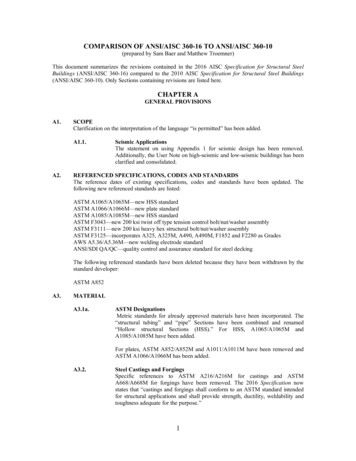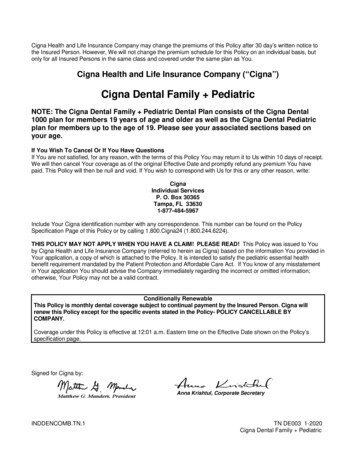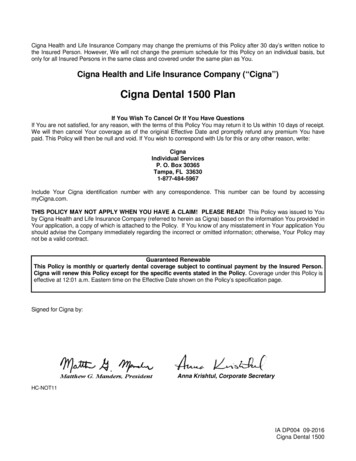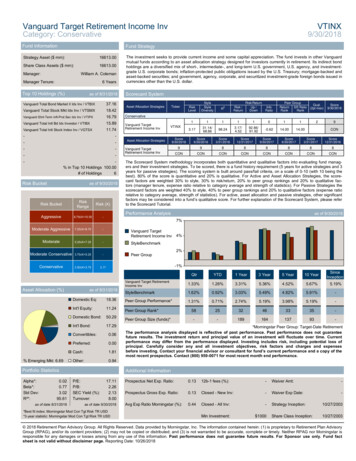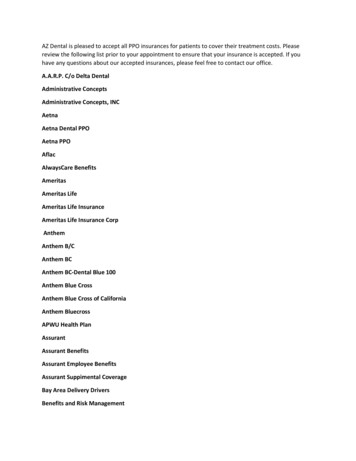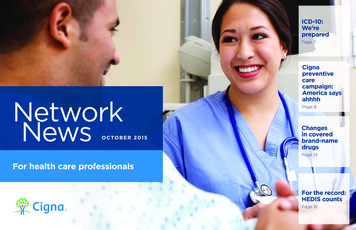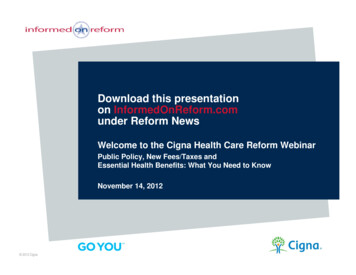
Transcription
CIGNA 360 WELL-BEINGSCORE STUDYWhite paper on our 2015 findings
WELCOMEWhat does good health and well-being look like? With so many factors influencing how we feel, it can be adifficult question to answer. Our health and well-being is affected by our diet and our activity levels, relationshipswith friends and family, the way we perform at work and even our finances.Taking the time to think about what’s important to people, as well as how they think they’re performing in keyareas impacting their well-being, will go some way to answering this key question. This provides valuable insightfor the individual themselves. But a much broader group stands to benefit from this better understanding- including employers, governments and health insurers.In an attempt to shed some light on this hot topic, Cigna first launched its annual 360 Well-being Score Study1in 2014. By asking a series of questions about five key areas contributing to overall well-being (physical, family,work, financial and social), we’re able to provide a view on priority areas and opportunities for improvement forkey a is a leading global health service company. This puts us in the fortunate position of being able to look atthese issues and trends globally. So as well as the UK, the study also includes respondents from a number ofregions internationally.The 360 Well-being Score Study is now an annual global well-being check-up. The second wave of the studyconducted in 2015 saw us connect with more than 15,000 people across 11 countries.Countries highlighted in blue were included for the first time in our 2015 study.
We’re pleased to share our findings from the 2015study in this white paper. And to get you started, hereare just some of the highlights:››››RANKCOUNTRYHEALTH 5UK63.56New Zealand62.77Spain62.18South Korea60.79Thailand60.310Hong Kong59.311Taiwan56.8The overall well-being of the UK compares wellwith other regions surveyed. Our 360 Well-being Score of 63.5 is ahead of theinternational average. However, as we get older,satisfaction with our well-being doesn’t hit thesame levels as those living elsewhere.Physical and family health are tied as thewell-being categories that are most important inthe UK. These are also the areas respondents toldus they’re most satisfied with.››Only a third rated their diet as being good and 1 in5 of the population doesn’t exercise at all.››Cancer, heart disease and mental illnesses are thehealth conditions that worry the UK populationthe most.But it seems that as we get older, satisfaction with ouroverall well-being doesn’t hit the same levels as thoseliving elsewhere.››Two thirds have used or would consider usingmobile apps and wearable devices to supporttheir health and well-being.Ageing and happiness››1 in 10 do not believe the NHS is currently meetingtheir health needs.››In an ageing society, 1 in 5 feel unprepared to takecare of their parents’ health and well-being.››Compared to other regions, a good work-lifebalance is more important than salary in the UK.››Only 1 in 5 feel they would manage their financesif they found themselves unable to work.International averageThe ‘Happiness Curve,’ or the ‘U-bend of life’2 as it’ssometimes known, is a recognised global trend. Itsuggests that from around the age of 18 we becomegradually less happy, reaching the lowest pointin our 40s. But as we head into our 50s, levels ofcontentment take off again.While the combined international findings fromour study follow this trend, here in the UK we don’texperience the same lift in happiness levels as weenter older age.UK WELL-BEING CHECKThe 360 Well-being Score Study takes an in-depthlook at five key areas – physical, family, work, financialand social. We challenged respondents to thinkabout how important each area is to them beforeasking them how satisfied they are with their currentperformance on each. Combining these dimensionsgives us a unique view which we can use to calculatean overall 360 Well-being Score for each regionincluded in the study.Global comparisonsSo how does the UK compare with our counterpartsin other regions? Our results show that we’re doingwell. The UK 360 Well-being Score is 63.5, puttingus just ahead of the international average of 63.4.Although we still have some work to do to close thegap on the highest scoring countries India and China.63.4InternationalUK60s20s40s60s20s50sSo why are over 50s in the UK less happy? Our resultsshow that physical and work health are the two keydrivers. And that’s not surprising given we have anageing population who are staying in the workplacebeyond typical retirement age in increasing numbers.This trend is bound to take its toll on the oldergeneration.The ageing workforce is a trend that’s here tostay – meaning it’s time for the government andemployers to step up and take action to keep peoplefit, productive and most importantly happy, in theworkplace - regardless of their age.
What’s important in the UK?Being ‘time poor’ is an idea that most of us can relate to. So when it comes to investing our precious time toimprove our well-being, it can be tricky to decide where to focus attention. But we’re pleased to report that inthe UK we’re managing this well.% ranking as most importantPhysical (44%)Family (44%)Social (6%)Financial (5%)Work (2%)Financial (29%)Work (33%)% who are satisfied with their performancePhysical (42%)Family (55%)Physical and family health are tied as the well-beingcategories that are most important to us. These arealso the areas that respondents told us they’re mostsatisfied with.Social (40%)We’ll now look at each of the five key pillars in turn tobetter understand the priority areas and opportunitieswhere key stakeholders can engage with the UKpopulation on their journey to better well-being.
PHYSICAL HEALTHAlmost three quarters of the UK population believe their physical health and well-being is good. This is a greatresult. However, when respondents were asked to rate their performance on areas that contribute towards beingin good physical health, their answers told us a slightly different story.Diet and exerciseA healthy futureAlmost half said they were either overweight orobese, making the UK, alongside Spain and NewZealand, one of the most overweight nations in thestudy. This isn’t surprising when you consider that.Feeling in good health today is one thing. But thatdoesn’t stop us all from having concerns about whatour health might have in store for us in the future.a third.only aroundwouldrate their diet as being excellent orvery good.On the positive side, there are signs we’re not happywith this situation.More than two thirdsCancer is consistently a top concern in the region with 6 in 10 of us worrying about it in the UK. Thisis closely followed by debilitating illnesses and heartdisease, which are on the minds of 52% and 42% ofthe population respectively.of Brits want to lose weight.But are those who need it most the ones embarkingon a weight loss journey? Unfortunately not. Ourresults show that of those who want to lose weight,more than a third already have a good BMI. Thisindicates there’s room for education around whatconstitutes a healthy weight.Anyone trying to keep their physical health in goodshape knows the important role exercise can play.1 in 5Yet almostof theUK population does notexercise at all.But credit to those who are exercising regularly.They’re managing to notch up the 150 minutes ofweekly physical activity recommended by the NHS.Sleep patternsThere are also improvements that could be made toour nocturnal habits. Although two out of five peoplestated they get sufficient sleep at night, with morethan a third saying this was good quality sleep, similarnumbers complained they aren’t clocking up enoughshut-eye.Experts recommend thatmost healthy adults needbetween 7.5 and 9 hoursof sleep each night.But Brits aremanaging only6.7 hours a nighton average.Mental illnesses are also regarded as a major concernin the UK. A third of people flagged these as aconcern, which is broadly in line with Mind’s statisticsthat 1 in 43 people in the UK will experience a mentalhealth problem each year.It’s not just the idea of developing a mental healthproblem that’s causing concern. More than 1 in 10are also worried about the support that would beavailable should they be unfortunate enough tosuffer from one. It’s widely known that the stigmaassociated with mental health problems remainsan issue in the workplace. Meaning there’s more tobe done to improve the conversation between linemanagers and employees when it comes to commonconditions such as stress, anxiety and depression.Myth versus factHeadlines about the latest health trends are hard toavoid. Understanding which to believe is even harder.To test how in tune Brits are with what it really meansto be in good physical and mental health, the 360 Well-being Score Study asked a series of true orfalse questions. These covered areas including cancer,stress, ageing and obesity.The good news is that compared to other countries inthe study, we’re relatively well informed about cancer,the key causes of stress, and our health needs aswe get older. Only those in New Zealand and Spainappear to be more informed. However, we fell belowaverage on our knowledge of the key contributors toobesity. We think there are fewer overweight peoplein the UK than there are. The perception is 45% butthe reality is up to 60%.
How many people are aware of the health facts?UKInternational58.6%53.2%Health improvementThe role of technologyMaking improvements to your health and well-beingis very worthwhile but not always easy. We all need alittle support from time to time. But who do we turnto for this support?For those trying to do it themselves, technologycan play a key role. The popularity of technologydesigned to monitor health and well-being hasincreased significantly in recent years.Our results show that we’re very independent – with athird claiming they’ll take all of the responsibility. Forthe rest, the NHS is seen as a good source.This is echoed in our results, with almost two thirdshaving used or considered using tools such as mobileapps and wearable devices to support their healthand well-being. For many it’s more than just a passingfad. Almost a quarter who use them claim to do so ona regular basis.But employers and health insurers should also belooking for opportunities to support the population intheir health improvement efforts. As NHS resourcesstruggle to meet demand, these groups can fillthe gap left behind. And it’s a win-win - both willultimately benefit from a healthier population in thelong term.Who do you see playing a role in helping you improve your health and well-being?Government /NHS47%I will take all the responsibility34%Your employer16%I have no plans to improve my health and well-being11%Your health insurer8%
NHS concernsMost of us will be familiar with recent headlines onthe struggle currently being experienced in the NHSto meet demand. A lack of proper support couldunfortunately dampen the enthusiasm of manylooking to improve their health.NHS figures4 for January 2016 show that almost onein 10 patients had to wait longer than 18 weeks fortreatment, with some waiting more than 52 weeks. Inaddition, 1 in 10 patients waited longer than four hoursin A&E.General practitioner (GP) appointments are alsoproving to be increasingly elusive.Perhaps as a result of these concerns, as manyas two thirds have already purchased or wouldconsider purchasing products designed to ‘topup’ the provision offered by the NHS.So the realisation is setting in that the publichealthcare system is perhaps not one to rely on overthe long term.A first step for many employers in improving theiremployees’ access to healthcare is introducing abenefit such as a private medical plan. Healthcareproviders are now working closely with employers toimprove healthcare even further.A recent survey of GPs5 indicatedthey expect a two week wait for anappointment to soon be the norm insome regions.It seems that the UK population is taking notice.Almost a third told us they areconcerned about the availabilityof the NHS with a further 1 in 10stating they do not believe theNHS is currently meeting theirhealth needs.And it’s a number which we expect to see grow overthe next few years.NHS provision aside, as many as three quarters of thepopulation do not believe they are in a good positionto finance their own or their family’s medical needs.Care pathways that offer speedy access todiagnostics by removing the need to see aGP in the first instance, and tools that offerproactive health advice and access to virtualGP appointments are adding further value toexisting plans.
FAMILY HEALTHRegarded equally as important as our physical health are our relationships with our families. So we’re pleasedour respondents report good quality relationships with their children, spouses and parents. With over half tellingus they’re happy with the amount of time they’re able to spend with their family.The study also found that as we get older, these family relationships become increasingly important.% who reported relationships with each family member importantAVERAGE18-2425-2930-3940-4950-5960 7%82%90%99%94%Parents83%83%84%84%83%78%82%Family holidaysLonger term needsA common way of spending good quality time withfamily is to go on holiday. Two thirds of peoplebelieve a family holiday is important, with threequarters saying it’s good for the family’s health andwell-being.Looking to the future, respondents express a concernabout their ability to take care of their family’s longerterm needs. 1 in 5 feel unprepared to take care oftheir ageing parents’ health and well-being. And thisrises to almost a third when it comes to their parents’financial needs.As a result, nearly two thirds of people said they wereplanning at least one holiday in the next 12 months.With the majority of people looking to spend up to 6,000 on their trips, it’s important to make surethey’re properly covered for this expense. A travelinsurance policy is essential to provide peace of mindin case the holiday doesn’t turn out as expected.While this might not be the biggest family concerntoday, it’s likely to intensify as the ‘sandwichgeneration’ starts to feel the pressure from caring forchildren and elderly relatives all while trying to remainproductive in the workplace.Research shows this is one of the most commonemployee benefits offered as part of flexible benefitsschemes, made available by 64% of employers6. Weexpect this to continue to be a valued employeebenefit.Employee Assistance Programmes (EAPs), targetedsupport for eldercare, flexible working arrangements,and even cover from benefits such as private medicaland dental plans for older dependants are all ways foremployers to ease the pressure on the 1 in 7 of us inthe UK who already combine paid work with caringresponsibilities7.And the ageing population issue doesn’t just concerntheir parents. It’s prompting this generation to thinkabout how their own long term care needs willbe provided for in the future. While it’s only a topconcern for 14% of the population today, we expectthis to increase over time.
WORKPLACE HEALTHWork is regarded as the least important contributorto our overall well-being in the UK. As a nation,we’re doing pretty well on the job satisfactionfront. Almost 7 in 10 told us that they think theirworkplace well-being is good. This varies acrossthe different industries making up the UK economywith employees in construction, IT and professionalservices rating higher than retail and hospitality.SECTORSATISFACTION WITHWORKPLACEWELL-BEINGConstruction83%Banking and financial73%Professional services76%IT79%Government74%Hospitality and tourism64%Manufacturing72%Retail66%Salary is the key driver of workplace well-being inmost regions included in our study. However, for theUK workforce, having a reasonable workload andhours, job stability and a good work-life balance areare rated higher.Work-life balanceIt seems the UK is achieving a better work-lifebalance than our colleagues in other countries. Ouraverage 38-hour week is amongst the shortest inthe study with employees in Hong Kong working thelongest at 44 hours a week. Our average annual leaveof 25 days is amongst the best in the study – toppedonly by Spain where employees are offered 30 dayson average.While salary can help to motivate employees,additional benefits are a key driver of an engagedworkforce. Unfortunately the study highlighted gapsbetween the benefits UK employees expect to beoffered and what their employers actually provide.More than three quarters of employeesfeel that having a flexible workingschedule is the most attractive workplacewellness benefit. However, only 1 in 5employers offer this option.The failure of employers to provide the expectedlevel of benefits is felt more keenly among lowermanagement. This isn’t surprising given benefits suchas private medical plans are often reserved for themore senior employees.Targeted solutions that allow employers to offerbenefits to more of their workforce are availableand should be considered by employers who areserious about increasing productivity and employeeengagement.Drivers of workplace well-being81%80%Reasonableworkload and hoursJob stability72%Having a goodwork-life balance66%Salary
FINANCIAL HEALTHIn the UK, top financial concerns are focused on financial security. Thinking about how you would managefinances if you suddenly found yourself unable to work might not be pleasant. But our results indicate it’s asituation more people in the UK should be planning for. Only 1 in 5 say they are performing well for this topconcern. But interestingly they aren’t as concerned about this as those in other regions included in our study.Top financial concernsHaving sufficient money for retirement58%Financial security if I’m unable to work54%Current financial situation48%Maintaining current standard of living47%Ability to pay for self and/or family’s education (e.g. children)41%Ability to pay for mortgage/housing38%Ability to meet my parent’s medical needs37%Ability to meet my own and/or my family’s medical needs34%Perceived financial performance is lowest amongstthose in their 50s. Perhaps this isn’t surprising asattentions are likely to be turning to retirementplanning at this stage. Worryingly, only 13% of this agegroup feel they have sufficient money for retirement.Other financial gaps we found amongst the over 50sin our study include:›A little over a quarter are properly preparedto look after their family’s financial well-beingin the event of their death.›8 in 10 aren’t very well prepared to look aftertheir family’s financial well-being in the eventof suffering a serious illness.›Almost two thirds aren’t properly prepared toleave their finances neat and tidy in the eventof their death.›More than three quarters aren’t fully satisfiedwith their ability to leave a nest egg for theirchildren or grandchildren.However, the ownership of products and servicesdesigned to provide security for these circumstancesis relatively low in the UK.With only around 1 in 10 owning a private medicalplan and just under a third having a life insuranceplan in place - are people relying too much on thestate to look after them and their families shouldthe worst happen? In today’s economic and politicalenvironment, how wise this is in the long term isquestionable.
SOCIAL HEALTHSocial health is easily overlooked when compared tosome of the other areas we covered in our study. Butwe know that good social interactions play a key rolein supporting good mental health.Unfortunately the survey highlighted some earlysigns of social isolation in the UK. Nearly a quarterof people said they either didn’t have any friends(7%) or had friends but didn’t feel comfortable totalk openly with them (15%). And almost 1 in 5 saidthey’re performing poorly when it comes to spendingsufficient time with friends.So what’s the driver of this? It’s easy to point thefinger at the Internet. But with the average Britspending as many as 34 hours each week on onlineor digital activities and 1 in 4 saying they cannot livewithout their smartphone, it seems the most likelycause.But we’re not so addicted to the Internet as some ofthe other countries included in our study. The Thai’sare racking up an average of 54 hours - or a massive45% of their waking hours - each week on digitalactivities.RANKCOUNTRYAVERAGE HOURSPER WEEK1Thailand542Hong 368 New Zealand348 UK349Spain3210Korea27Average27The bigger pictureThere are bigger social issues keeping us awakeat night too. The UK economy is showing signs ofrecovery, but it seems that consumer confidencehasn’t improved at the same pace. Although it’s lessof a concern than when we asked last year, almost athird of respondents continue to rate the economyas one of their top social issues. More specifically, thecost of living is the key concern, noted by over half ofrespondents.It seems that employers are responding to thisconcern. Financial advice and counselling is one ofthe fastest growing benefits. There has been a 34%increase in the number of employers now offeringaccess to this service as part of their flexible benefitsschemes.HOW CIGNA CAN HELPWe hope you have found the results of our secondannual Cigna 360 Well-being Score Studyinteresting.In the UK, Cigna HealthCare Benefits has many yearsof experience of helping employers support theiremployees’ health, well-being and sense of security toultimately address some of the issues outlined in thisreport.As well as providing private medical plans and dentalbenefit solutions, we have developed a range ofservices to encourage greater health engagement.By providing employees with access to support andinformation, wherever they are on their health journey,we help them to make informed choices about theirhealth and well-being.A good example of this is our “Living Life to the Full”programme. This is an online coaching programmethat teaches individuals the skills and techniquesthey need to tackle feelings of low mood, stress anddistress.Another example is our new health and well-beingapp Cigna Virtual Health. Our app helps you on yourjourney to better health. It gives you access to onlinetools to suit your personal healthcare needs. Youand your dependants can access expert advice andsupport at your fingertips, allowing you to manageyour health on the go.We also offer a number of services that are designedto help employees address specific health concernsthey might have. For example, our OneStop breastcancer diagnostic service provides rapid access tocancer specialists including a triple assessment in oneappointment. Being able to access this quickly andconveniently can provide considerable reassurance toemployees.For more information about how we can help you and your employees improve yourhealth and well-being, contact our sales representative.Email - CBC@Cigna.comTelephone - 01475 788779.
Sources:(1) Cigna International, “Cigna 360 Well-being Score Survey, September 2015, 1,000 UK responses(2) Development Psychology, “Up, Not Down: The Age Curve in Happiness from Early Adulthood to Midlife In Two LongitudinalStudies”(3) Mind, ems/.(4) NHS England, icssummary-2016-January-V0.1.pdf(5) Pulse Magazine, e(6) Employee Benefits Magazine, 14/index.html(7) Employers for Carers, e-is-good-for-businessConfidential, unpublished property of Cigna. Do not duplicate or distribute. Use and distribution limited solely to authorised personnel.Copyright Cigna 2016. All rights reserved.Cigna HealthCare Benefits is a trading name. The following companies are part of that group: Cigna Life Insurance Company of Europe S.A.-N.V. - UKBranch, Chancery House, 1st Floor, St Nicholas Way, Sutton, Surrey SM1 1JB - registered in Belgium with limited liability (Brussels trade register no.0421 437 284), Avenue de Cortenbergh 52, 1000 Brussels, Belgium, authorised by the National Bank of Belgium and subject to limited regulation bythe Financial Conduct Authority and Prudential Regulation Authority. Details about the extent of our regulation by the Financial Conduct Authority andPrudential Regulation Authority are available from us on request. Cigna European Services (UK) Limited, registered in England (UK Company no. 199739),Chancery House, 1st Floor, St Nicholas Way, Sutton, Surrey SM1 1JB. VAT Registration No. 7404454517022 MED/POST/ER/0616
Cigna is a leading global health service company. This puts us in the fortunate position of being able to look at these issues and trends globally. So as well as the UK, the study also includes respondents from a number of regions internationally. The 360 Well-being Score Study is now an annual global well-being check-up. The second wave of .
